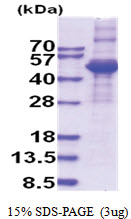TGF-beta-3 (TGFB3) (24-412, His-tag) Human Protein
Other products for "TGFB3"
Specifications
| Product Data | |
| Species | Human |
| Expression Host | E. coli |
| Expression cDNA Clone or AA Sequence |
MGSSHHHHHH SSGLVPRGSH MGSLSTCTTL DFGHIKKKRV EAIRGQILSK LRLTSPPEPT VMTHVPYQVL ALYNSTRELL EEMHGEREEG CTQENTESEY YAKEIHKFDM IQGLAEHNEL AVCPKGITSK VFRFNVSSVE KNRTNLFRAE FRVLRVPNPS SKRNEQRIEL FQILRPDEHI AKQRYIGGKN LPTRGTAEWL SFDVTDTVRE WLLRRESNLG LEISIHCPCH TFQPNGDILE NIHEVMEIKF KGVDNEDDHG RGDLGRLKKQ KDHHNPHLIL MMIPPHRLDN PGQGGQRKKR ALDTNYCFRN LEENCCVRPL YIDFRQDLGW KWVHEPKGYY ANFCSGPCPY LRSADTTHST VLGLYNTLNP EASASPCCVP QDLEPLTILY YVGRTPKVEQ LSNMVVKSCK CS
|
| Tag | His-tag |
| Predicted MW | 47.2 kDa |
| Concentration | lot specific |
| Purity | >85% by SDS - PAGE |
| Buffer | Presentation State: Purified State: Liquid purified protein Buffer System: Liquid, In 20mM Tris-HCl (pH8.0) containing 10% glycerol. |
| Preparation | Liquid purified protein |
| Protein Description | Recombinant human TGFB3, fused to His-tag at N-terminus, was expressed in E.coli. |
| Storage | Store undiluted at 2-8°C for one week or (in aliquots) at -20°C to -80°C for longer. Avoid repeated freezing and thawing. |
| Stability | Shelf life: one year from despatch. |
| Reference Data | |
| RefSeq | NP_001316867 |
| Locus ID | 7043 |
| UniProt ID | P10600 |
| Cytogenetics | 14q24.3 |
| Synonyms | ARVD; ARVD1; LDS5; RNHF; TGF-beta3 |
| Summary | 'This gene encodes a secreted ligand of the TGF-beta (transforming growth factor-beta) superfamily of proteins. Ligands of this family bind various TGF-beta receptors leading to recruitment and activation of SMAD family transcription factors that regulate gene expression. The encoded preproprotein is proteolytically processed to generate a latency-associated peptide (LAP) and a mature peptide, and is found in either a latent form composed of a mature peptide homodimer, a LAP homodimer, and a latent TGF-beta binding protein, or in an active form consisting solely of the mature peptide homodimer. The mature peptide may also form heterodimers with other TGF-beta family members. This protein is involved in embryogenesis and cell differentiation, and may play a role in wound healing. Mutations in this gene are a cause of aortic aneurysms and dissections, as well as familial arrhythmogenic right ventricular dysplasia 1. [provided by RefSeq, Aug 2016]' |
| Protein Families | Druggable Genome, Secreted Protein, Transmembrane |
| Protein Pathways | Cell cycle, Chronic myeloid leukemia, Colorectal cancer, Cytokine-cytokine receptor interaction, Dilated cardiomyopathy, Hypertrophic cardiomyopathy (HCM), MAPK signaling pathway, Pancreatic cancer, Pathways in cancer, Renal cell carcinoma, TGF-beta signaling pathway |
Documents
| FAQs |
Resources
Recombinant Protein Resources |
{0} Product Review(s)
0 Product Review(s)
Submit review
Be the first one to submit a review
Product Citations
*Delivery time may vary from web posted schedule. Occasional delays may occur due to unforeseen
complexities in the preparation of your product. International customers may expect an additional 1-2 weeks
in shipping.






























































































































































































































































 Germany
Germany
 Japan
Japan
 United Kingdom
United Kingdom
 China
China
